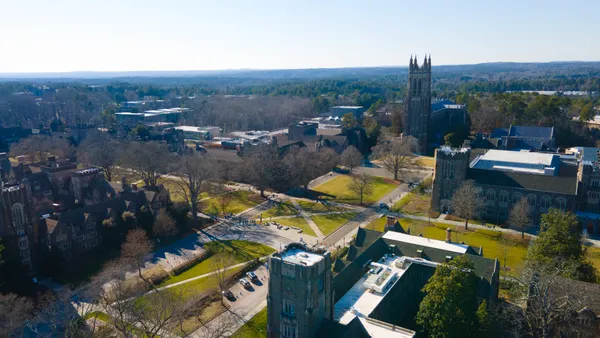Dive Brief:
- More than half (52%) of young adult voters support impeachment proceedings against President Donald Trump and his removal from office, among a number of other progressive positions, according to a new poll from Harvard University's Kennedy School Institute of Politics.
- But members of this group are more divided on how to address major issues in the country. Of the 2,000 students surveyed, who ranged from 18 to 29 years old, 40% said they prefer policies that "stand a good chance of being achieved as opposed to sweeping changes that will be difficult to carry out." One-third said they preferred structural changes.
- The new data comes at a time when college-age citizens are emerging as an influential voting bloc, with their turnout for the 2018 midterm election proving to be the highest in recent years.
Dive Insight:
The Institute of Politics is one of the most prominent entities that gauges the political opinions of voters in the traditional college-age range of 18 to 22 years and older. It regularly releases data about students' and others' beliefs on current issues.
As the 2020 presidential campaign heats up, the students who conducted the polling focused on just a few subjects that have been under scrutiny: the Electoral College, gun reform and eliminating private health insurance, among others.
In addition to 52% of young adults supporting impeachment, about 38% want government-run health care. Roughly 40% believe the Electoral College should be replaced with a popular vote.
The institute tried to get a sense of the respondents' political attitudes and philosophies as well.
Slightly more than half of those who answered the poll believe the country is off track, and respondents were split in how to move forward. While 40% prefer more focused policies rather than sweeping changes, 34% are seeking large structural changes, even if they might be challenging to implement.
"Proponents of structural reforms shouldn't take young voters for granted, and those who favor a more gradual approach shouldn’t write us off," said Richard Sweeney, a Harvard student and co-chair of the Harvard Public Opinion Project, a biannual poll.
The institute estimated Millennials and Generation Z will account for one-third of eligible voters in 2020.
Student participation skyrocketed in the 2018 midterm election. Some 40% of eligible college students cast ballots that year, doubling the participation rate from the 2014 midterm when only 19% voted, according to reports from the Tufts University Institute for Democracy and Higher Education.
Researchers there examined enrollment records of more than 10 million college students to determine voter trends.
Civic engagement experts have attributed this upswing to the current political climate and students' keen interest in issues such as gun control and immigration. And politicians are paying attention to students' voting habits.
Students accused Iowa Gov. Kim Reynolds earlier this year of limiting their voting rights after she scheduled two special elections for state seats during times when students would be away from certain campuses.
And in 2018, New Hampshire Gov. Chris Sununu signed a law requiring part-time residents to switch to permanent status if they want to vote. It was derided as a way to suppress the vote of young college students, who are often transient and more progressive than older generations. About 58% of 18-to-25-year-olds identified as Democrats or leaned Democrat, the Pew Research Center found in 2016.











